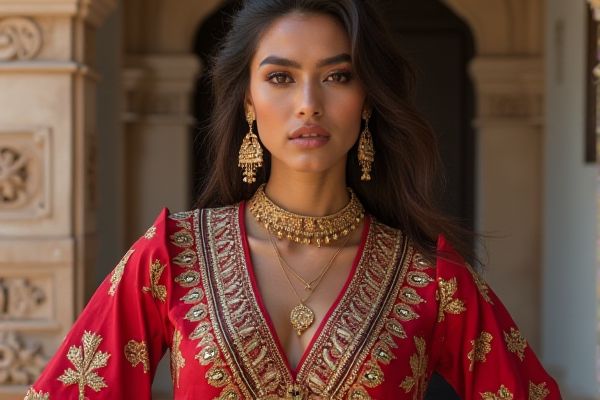
India boasts a vibrant ethnic clothing landscape, with brands like Fabindia offering a wide variety of traditional garments. These include handloom sarees, kurta sets, and accessories that reflect regional craftsmanship. Your choices can encompass styles from different states, such as Rajasthan's bandhani or Punjab's phulkari. Embracing these unique pieces supports local artisans and preserves diverse cultural heritage.
Brands to consider
Fabindia
Fabindia is a prominent ethnic clothing brand in India, recognized for its commitment to traditional craftsmanship and sustainable practices. It offers a diverse range of products, including sarees, kurtas, and home furnishings, showcasing handwoven textiles and natural dyes. The brand supports rural artisans, contributing to local economies and preserving heritage. By choosing Fabindia, you support eco-friendly initiatives while embracing authentic Indian culture in your wardrobe.
Biba
Biba offers a unique blend of traditional and contemporary styles, making it a popular choice for ethnic clothing in India. The brand specializes in vibrant Punjabi suits, stylish kurtas, and elegant salwar kameez that reflect India's rich cultural heritage. Crafted with intricate embroidery and high-quality fabrics, Biba's apparel appeals to diverse customer preferences. With its commitment to sustainability and ethical practices, choosing Biba supports environmentally friendly fashion in India. Your wardrobe can benefit from the brand's wide range of sizes and versatile designs suitable for various occasions.
W
W is a prominent ethnic clothing brand in India, known for its contemporary designs that blend traditional aesthetics with modern fashion. The brand offers a diverse range of apparel, including Kurtis, salwar suits, and fusion wear, catering to various occasions and preferences. W incorporates high-quality fabrics and intricate craftsmanship, making it suitable for both casual and festive wear. By focusing on vibrant colors and patterns, W reflects the cultural richness of India while appealing to the urban consumer's taste. Your wardrobe can benefit from W's unique style that celebrates ethnic fashion.
Manyavar
Manyavar is recognized as a leading ethnic clothing brand in India, known for its exquisite designs that celebrate Indian culture and heritage. The brand offers a wide range of traditional wear for men, including sherwanis, kurtas, and regal wedding attire, catering to various ceremonies and festivals. Manyavar emphasizes high-quality craftsmanship, often using luxurious fabrics adorned with intricate embroidery. With numerous stores across the country and a strong online presence, Manyavar provides easy accessibility for customers seeking premium ethnic fashion. Your choice of Manyavar can enhance the experience of important celebrations with elegant and timeless pieces.
Ritu Kumar
Ritu Kumar represents the essence of Indian heritage through its intricate designs and traditional textiles. The brand features a variety of ethnic wear, including sarees, lehengas, and kurtas, crafted with historical techniques and natural fabrics. With a commitment to sustainability, Ritu Kumar supports local artisans and preserves age-old craftsmanship, contributing to the cultural richness of Indian fashion. Your choice of Ritu Kumar not only showcases elegant attire but also promotes a greater appreciation for India's artisan community.
Traditional craftsmanship
Traditional craftsmanship in India showcases exquisite textile techniques and intricate embroidery that reflect the rich cultural heritage of the country. Ethnic clothing brands like FabIndia utilize these skills to create garments that honor regional craftsmanship while appealing to contemporary fashion sensibilities. Handwoven fabrics, block printing, and artisanal embellishments tell the story of local artisans dedicated to preserving age-old methods. Your appreciation for these unique pieces not only supports sustainable fashion but also promotes the livelihoods of skilled craftsmen across India.
Cultural heritage inspiration
Ethnic clothing brands in India, such as Fabindia, draw inspiration from rich cultural heritage, reflecting diverse traditions and craftsmanship. Textiles like Banarasi silk, block prints from Rajasthan, and ikat from Odisha showcase regional artistry. The clothing often incorporates traditional embroidery techniques, such as zari and kantha, highlighting local artisans' skills. Your fashion choices can celebrate this vibrant cultural tapestry, promoting sustainable practices and supporting local communities.
Local fabric sourcing
Local fabric sourcing in India plays a significant role in supporting regional artisans and promoting sustainable fashion practices. Brands like Fabindia focus on traditional weaving techniques and natural dyes, ensuring authenticity in their ethnic clothing lines. By collaborating with local weavers and craftsmen, you can enhance the cultural richness of your garments while providing fair-trade opportunities. This approach not only preserves heritage but also responds to the growing consumer demand for ethically-produced apparel.
Fusion of modern and traditional designs
The fusion of modern and traditional designs has become a defining trend in the ethnic clothing brand landscape in India. Brands like Fabindia showcase this blend by incorporating contemporary silhouettes with traditional fabrics and handloom techniques. This approach appeals to a diverse audience, encouraging the integration of cultural heritage with current fashion sensibilities. Your choice of designers who embrace sustainability can enhance your wardrobe while supporting local artisans and craftsmanship.
Sustainability practices
Implementing sustainability practices in an ethnic clothing brand in India can significantly enhance brand reputation. Prioritize sourcing organic fabrics, such as khadi or linen, which minimize environmental impact. Incorporate traditional dyeing techniques that use natural ingredients, reducing chemical usage. Engage local artisans to promote fair trade, ensuring that cultural craftsmanship is preserved while supporting local economies. You may also explore recycling initiatives to repurpose old garments and reduce textile waste.
 indiabrand.org
indiabrand.org